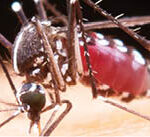To end malaria in Nigeria, pest control through source site management must be a vital component of its control and elimination strategies, the Pest Control Association of Nigeria (PECAN) has said.
Terungwa Abari, chairman of the Federal Capital Territory (FCT) chapter of PECAN, stated this yesterday during a pest control exercise carried out by the association at the Destined Children Orphanage in Abuja to commemorate this year’s World Malaria Day. The association also donated food items to the orphanage.
- NIGERIA DAILY: Why Begging Was Introduced To Tsangaya Schools
- Nigeria importing bitumen despite 42.7bn metric tons reserve — FG
Mr Abari said doing so was important because it was highly effective in preventing infection and reducing disease transmission.
He further said governments and regional institutions in Africa had launched numerous programmes on malaria, but that the disease and other vector-borne diseases peculiar to the sub-Saharan Africa still lingered.
According to him, this could be because of the interventions not being multi-sectoral or lacking sustained and diligent implementation of a critical component such as vector management.
He said, “In most cases, approaches are focused more on activities to diagnose, control and treat malaria like establishment of disease management centres and provision of malaria drugs and Long-Lasting Insecticide Treated Net (LLITN), etc. leaving a key component like pest control through source site management out of the focus.
“When committees are set with regards to finding a holistic solution to malaria and vector borne diseases, the pest control professionals that should be integral to such efforts are not mentioned among the other professions drawn.”
He added that there must be a paradigm shift and change from the neglect of controlling the mosquito vector from the source in order to achieve the theme of this year’s World Malaria Day: “Harness Innovation to Reduce the Malaria Disease Burden and Save Lives”.
While noting that the role of pest control practitioners in the industry was very vital to environmental health and safety, he said experts had attributed quality of life to a better sanitation and pest control among other healthy practices.
He further said research had also shown that 60 per cent of human diseases were caused by the animal reservoir such as pests, including mosquitoes and rodents.
He advised that government should not continue to spend huge resources solely on drugs and nets, adding that significant percentage of the resources should be channeled to pest control “which is the focal point of integrated vector management.
“What needs to be done to end malaria for good is prevention, not treatment, pest control, not drugs.”
The director of Destined Children Orphanage, Chukwuemeka Emerson, thanked the organisation for the pest control exercise, saying it would help control mosquitoes and other pests affecting the orphanage.
 Join Daily Trust WhatsApp Community For Quick Access To News and Happenings Around You.
Join Daily Trust WhatsApp Community For Quick Access To News and Happenings Around You.

